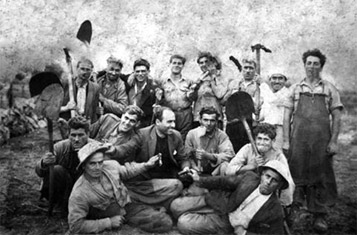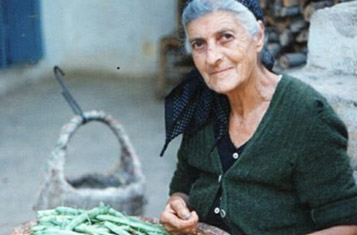|
June 14, 2014
Article on Bezbina appeared in THE
DAILY STAR � By
Misbah al-Ali

BEZBINA, Lebanon:
Residents of the northern district of Akkar are romantics; they wake
early to see the sun rise and stay up to watch the stars in the night
sky with a lullaby made up of the sounds of streams and creeks.
These residents are
plagued by daily challenges, but they also carry a unique beauty, and
their love of leading a tranquil life transforms their already charming
personalities into poetic ones.
Akkar is not a
deprived and neglected land as much as it is a completely overlooked
one, and it will remain so as long as Mount Lebanon embodies the image
of the ideal Lebanese countryside, even though other areas are no less
folkloric.
Bezbina is one such
town. Lying at the center of the villages scattered on the farthest
northern Lebanese mountain range, its residents refuse to leave even
during the winter, putting their roots ahead of work opportunities or
even education.
One of its residents
is Rajia, an employee at the Social Affairs Ministry who Sundays can be
found busy preparing lunch in her kitchen and keeping watchful eyes on
each of her two boys, George and Nehmeh. George tends to play outside in
the square, while Nehmeh, who suffers from a physical disability that
makes movement difficult for him, spends his time on the Internet in the
living room.

A 1958 photo taken by
Saad Moussa shows men taking break while working in rehabilitating
orchards.
Her mother-in-law, Umm
Ayoub, helps around the house as much as she is able, while her husband,
Father Ayoub Nehmeh, makes his phone calls and greets visitors.
Not yet 40, his smile
is warm and gives him a different air from the usual seriousness of
religious men. A portrait of his late father, Abu Ayoub, known around
the town as a generous, selfless man, hangs in the house.
None of the family has
ever lived outside their village, which lies at the bottom of the famed
Qamoua mountain reserve. Ayoub and Rajia leave for the Akkar capital of
Halba for work in the morning and return in the afternoon. Their home is
never locked; in fact, there has been no key to the house since
Abu Ayoub owned
the home.
�Where am I to go?
Give me a place more beautiful than the heaven I live in and more
beautiful than this castle,�
Umm Ayoub says
in her thick Akkari accent, gesturing around at her humble home of two
bedrooms, a kitchen and a living room with its garden and orchard
outside.
Rajia has one
complaint, however � social media websites, with their slow but sure
penetration into her otherwise peaceful life.
�The idea of
permanently living here turns this invention into a demon inside the
house, where you find everyone glued to their phone screens, unaware of
the other�s presence,� she tells The Daily Star.
For Nehmeh, even
though he says it is his disability that has prevented him from leaving
the town, the land still means much to him.
�Here I can feel the
day and the night and the morning and the evening, and I use my senses
by looking at the sky or hearing the sound of flowing water, the shining
summer sun and the snow that covers everything in winter. Here
everything is beautiful in the details,� he explains.
George, on the other
hand, absolutely refuses to come inside. Clearly the leader of the
group, he bosses around the other children in the neighborhood on
matters that seem trivial to an adult, such as taking Umm Ibrahim�s
groceries from the market or pushing Abu Ali�s broken-down car.
�Here I don�t feel
like I am living inside an apartment that is closer to a prison like
where you live. Here I have my full freedom and I never settle down in
one place, I move from the square to the orchards,� he says.
Mocking city life, he
tells a story of how his father once decided to take him to the beach,
assuming that it would make him happy. He was met instead with dirt and
sand, and ached the whole of the following night, something he claims
never happens when he goes swimming in the river.
Not too far from
Father Ayoub Nehmeh�s home lives Nicolas Issa, a retired arts professor.
As his wife Isabelle prepares the afternoon coffee, he calls for her to
come watch a belly dancer perform on television.
Isabelle calmly
ignores him, perhaps a result of her years of teaching at the public
school only a couple of meters away from the house.
She says she too is
addicted to the village, even though two of her three children no longer
live in Bezbina.
�Sometimes I surprise
myself when I get in the car, I am so stable in the village and I never
want to leave it,� she says.

Umm Jaoudat, a
resident of Bezbina, sorts beans in front of her house. (Photo courtesy
of Saad Moussa).
�When I used to go to
the college in the morning I used to feel strange because I would be
away from the village for hours, and I�ve only travelled abroad once for
two weeks,� chimes in Issa with a grimace. �I can�t describe the pain in
my heart the entire time.�
Issa is not only a
professor of art, but he is also a theater enthusiast. He established a
local theater in 1974 and has put on a play every year since then.
�We suffer from
hardship and a lack of resources here, but at the same time there is an
outpouring of romance,� Issa says. �Here we do not just feel love, we
experience it every day and we practice it in the details of our hard
lives, or we would not have been able to carry on like this.�
When visitors arrive,
Issa moves the assembled party to the orchard, where he tells of how he
sometimes passes the night sleeping under the trees and the starry sky.
�There I get back my
nostalgia, love, and heartbreaks, there I feel happiness and sadness at
the same time, but in my own way,� he explains as his friends cheer him
on.
For Saad Moussa, his
way of expressing his love for his hometown is through photography.
�I feel proud when I
look at someone�s features as I am giving him a picture of one of his
grandparents or his relatives,� he explained. �It provides me with a
sort of inner weapon. I don�t have any money and I am usually careful
about my expenses, but I would never trade in my hobby because when I do
I lose this pleasure.�
Despite having had a
series of shows in Lebanon and even in France, today he is a farmer who
spends all his time in his village, the residents and features of which
are a never-ending source of inspiration for his camera.
As he picks through
each photo, he explains its history. The pictures, he says, focus on
beauty he has not seen anywhere else: trees, bushes, streams, and good,
genuine people who he has been photographing for a long time.
Despite the sweltering
summer, Moussa turns on the heater and stays cozy indoors as though it
were still winter.
�Whoever wants an aim
in his life needs to sacrifice something, and whoever wants to take my
photos needs to tolerate the high temperature in my home.�
A version of this
article appeared in the print edition of The Daily Star on June 14,
2014, on page 3.
Read more:
http://www.dailystar.com.lb/News/Lebanon-News/2014/Jun-14/260072-akkar-residents-temper-hardship-with-romance-of-rural-life.ashx#ixzz34vDLsut8
(The Daily Star: Lebanon News: http://www.dailystar.com.lb)
|









